国际法导论
国际法

国际法国际法第一章导论第一节国际法的概念一、国际法的概念和演变国际法(International Law)是一个与国内法相对应的法律体系。
它是国家间交往中形成的、主要是调整国家之间关系的、有拘束力的原则、规则和制度的总体。
国际法与国内法二者共同构成了当代人类社会完整的法律秩序。
国际法一词准确地反映出了其所覆盖的法律体系的基本特点和主要调整对象。
英国法学家边沁最早引入“国际法”一词,后被广泛采用。
有人使用“国际公法”(Public International Law)一词来称呼这一法律体系(其传人中国早期,也被称为“公法”),强调的也是其调整国家(政府)与国家(政府)间关系的这种特征。
此处“公”的含义与当代有些学者在国内法研究时所使用的“公法”一词中“公”的含义或范围有所不同。
从法律体系上看,国际法体系是与整个国内法体系相对应的,而不是与“国际私法”一词所指代的内容相对应。
后者的主要内容属国内法范畴,虽然在其内涵和范围等方面还存在不同的理解和争议(参见国际私法编)。
国际法是国际关系发展的产物。
古代社会就有关于条约、使节等方面的一些规则和制度的雏形,但它们是零星的、小范围的和萌芽性的。
近代国际法诞生于欧洲,是以独立主权国家兴起为基础的。
1643~1648年结束欧洲30年战争的威斯特伐利亚和会和《威斯特伐利亚和约》,标志着一批近代主权独立国家的出现,成为近代国际关系的起点;同时它确认了国家主权、主权平等的根本原则,标志着近代国际法的开始。
同一时期,荷兰人格劳秀斯发表了《战争与和平法》(1625),第一次从理论上对国际法的规则和基本问题进行了系统全面的论述,并努力使国际法从神学的桎梏中解放出来。
这部著作对威斯特伐利亚和会产生了积极影响,为近代国际法学奠定了基础。
格劳秀斯因而被称为“近代国际法学之父”。
在此后的200余年间,国际法主要在欧洲基督教国家之间适用,并且随着欧洲国际关系的发展而发展。
西方资产阶级革命后,产生了包括“不干涉内政”在内的一些进步原则,对国际法的发展产生了积极的影响。
国际法导论讲义
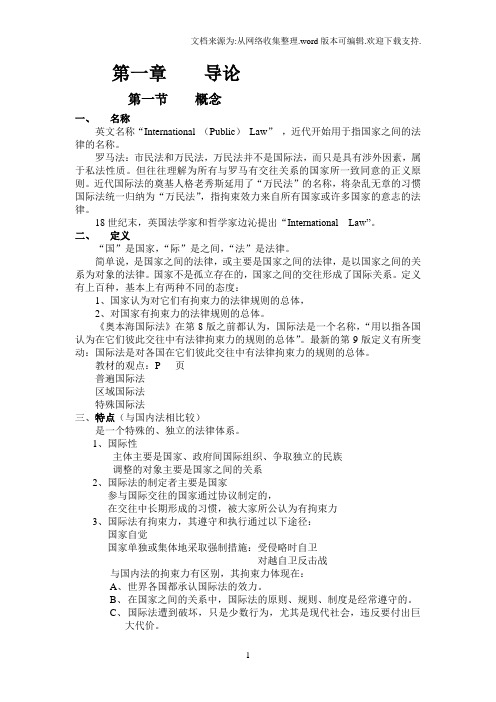
第一章导论第一节概念一、名称英文名称“International (Public)Law”,近代开始用于指国家之间的法律的名称。
罗马法:市民法和万民法,万民法并不是国际法,而只是具有涉外因素,属于私法性质。
但往往理解为所有与罗马有交往关系的国家所一致同意的正义原则。
近代国际法的奠基人格老秀斯延用了“万民法”的名称,将杂乱无章的习惯国际法统一归纳为“万民法”,指拘束效力来自所有国家或许多国家的意志的法律。
18世纪末,英国法学家和哲学家边沁提出“International Law”。
二、定义“国”是国家,“际”是之间,“法”是法律。
简单说,是国家之间的法律,或主要是国家之间的法律,是以国家之间的关系为对象的法律。
国家不是孤立存在的,国家之间的交往形成了国际关系。
定义有上百种,基本上有两种不同的态度:1、国家认为对它们有拘束力的法律规则的总体,2、对国家有拘束力的法律规则的总体。
《奥本海国际法》在第8版之前都认为,国际法是一个名称,“用以指各国认为在它们彼此交往中有法律拘束力的规则的总体”。
最新的第9版定义有所变动:国际法是对各国在它们彼此交往中有法律拘束力的规则的总体。
教材的观点:P 页普遍国际法区域国际法特殊国际法三、特点(与国内法相比较)是一个特殊的、独立的法律体系。
1、国际性主体主要是国家、政府间国际组织、争取独立的民族调整的对象主要是国家之间的关系2、国际法的制定者主要是国家参与国际交往的国家通过协议制定的,在交往中长期形成的习惯,被大家所公认为有拘束力3、国际法有拘束力,其遵守和执行通过以下途径:国家自觉国家单独或集体地采取强制措施:受侵略时自卫对越自卫反击战与国内法的拘束力有区别,其拘束力体现在:A、世界各国都承认国际法的效力。
B、在国家之间的关系中,国际法的原则、规则、制度是经常遵守的。
C、国际法遭到破坏,只是少数行为,尤其是现代社会,违反要付出巨大代价。
四、作用1、判断国际是非的标准,国际上的行为规则,2、确定国家具体的权利和义务关系的一种法律形式,3、国家在国际交往中自我约束的一种法律依据,4、国际裁判的法律依据。
国际法学第一章导论

正在争取独立的民族或民族解放 运动组织
争取独立的民族的国际法主体资格问题,是在 民族解放和独立运动发展过程中提出来的 . 二战以后,殖民地和附属国人民反对殖民主义 统治的斗争更加蓬勃发展,特别是60年代以后, 联合国的会员国从51个增加到现在的192个, 其中绝大部分是新独立的国家。为此,联合国 大会在1960年专门通过了一项宣言---《给予殖 民地国家和人民独立的宣言》(决议1514号)。
•《规约》第38条的全文如下:“法院对于陈述各项
争端,应依国际法裁判之,裁判时应适用:
•
(子)不论普通或特别国际协约,确立诉讼当 事国明白承认之规条者。(international conventions, whether general or particular, establishing rules expressly recognized by the contesting parties)
联合国总部
联合国大会1946年决定将联合国总部设在纽约。 同年,洛克菲勒家族用850万美元买下了哈得逊 河河畔这块18英亩的土地,赠送给联合国。 1952年这栋大楼正式完工并投入使用。在当时 看来,联合国总部大楼无论从设计上还是建筑 上都是世界一流。
国际组织是国际法的派生性主体
国际组织是指若干国家或其政府通过缔结国际 条约或经国家认可而建立活动的常设机构,亦 称政府间国际组织。其主体资格体现在: 国际组织在一定范围内有独立参与国际关系的 能力。 国际组织已具备作为国际法主体的各方面的权 利能力和行为能力 国际组织的主体资格已为一系列国际条约及有 关国际法文件所承认
二、 关于国际法的定义
国际法是指调整国际法主体之间、主要是国 家之间关系的,具有法律拘束力的原则、规 则和制度的总和。是为满足以国家为成员的 国际社会需要而产生的;这些原则、规则和 制度是通过国际程序而形成的。
第一章:国际法导论

The Basis of International Law
第四节 国际法与国内法的关系
国际法与国内法的关系是国际法的一个基本 理论问题,也是一个实践问题,其根本的问 题在于国际法如何在国内实施。 国际法与国内法的关系涉及到两个问题,一 是国际法和国内法是属于同一个法律体系还 是属于两个不同的法律体系;二是如何使国 际法在国内产生法律效力。 对第一个问题的回答产生了一元论、二元论
第一节 国际法的概念 Concept of International Law
between nations\law among nations\ nations) ,即万国法 3、International law 1870年英国学者
边沁正式提出国际法 中国:1864年最初译为“万国公法” 中国:1864年最初译为“万国公法”,清 未后从日文译为“国际法” 未后从日文译为“国际法”
二、国际法的定义及其主要特征
1、定义:国际法是国家相互交往过程中形成的, 主要是调整国家间关系的具有法律拘束力的原则、 规则和制度的总称。 2、特征: (1)国际法的主体主要是国家; (2)国际法是通过国家间的协议制定的; (3)国际法的实施主要依靠国家单独或集体 的力量。
PROBLEMS OF DEFINITION
American Law Institute, Restatement
of the Foreign Relations Law of the United States (Third) §101(1987)
三、国际法与相邻法律部门的关系
国际法与国际私法
International Law and Private International Law
1、通过国内立法使条约在国内有法律效力, 如英国、比利时; 2、条约是国内法的一部分,在国内有效力, 不需要经过特别立法程序,如日本、法国 和德国; 3、 美国将条约分为“自动执行条约”和 美国将条约分为“自动执行条约” “非自动执行条约”,前者不需经过立法 非自动执行条约” 程序即可在国内法院得到适用,后者则需 经过立法程序转化为国内法后才可以被法 院适用。
国际法导论(General Introduction)

• 1.概念 • 1、周鲠生(1889-1971): • 国际法是在国际交往过程中形成出来的,各国承认的, 表现这些国家统治阶级的意志,在国际关系上对国家具有 法律拘束力的行为规范,包括原则、规则和制度的总体。 • 2、王铁崖(1913-2003): • 国际法主要是调整国家之间的关系的有法律约束力的原 则、规则和制度的总体。 • 3、梁西(1924-- ): • 国际法是在国际交往中形成的,用以调整国际关系(主 要是国家间关系)的,有法律约束力的各种原则、规则和 制度的 • 总称。
第七节 国际法与国内法的关系
• 二、国际法与国内法关系的实践
• (一)从国际法方面看 • (二)从国内法方面看
• 三、我国关于国际法与国内法关系的实践
• (一)条约(1)条约在国内的适用方式 • A.纳入(adoption),俄国; • B.转化(transformation):英国 • C.混合式 • 自动执行条约(self-executing treaty) • 非自动执行条约(non-self-executing):美国 • (二)国际习惯:国际习惯法规则只要不与现行国内法相冲突,则构成国
第四节 国际法的渊源
• 二、国际法的具体渊源
• • • • (一)条约 (二)国际习惯 (三)一般法律原则 (四)确定法律原则的补助资料:司法判例及权威公 法学家学说 • (五)公允及善良原则 • (六)国际组织、国际会议决议 • (七)准条约、软法
• 严格法律意义上的国际法渊源 • 1、国际条约(主要渊源) • a.造法性条约 • b.契约性条约 • 2、国际习惯(主要渊源) • a.国际习惯的形成条件 • · 物质因素:通例 • · 心理因素:被接受为法律 • b.国际习惯的形成 • c.国际习惯的查明 • e .国际习惯和国际条约之间的关系
教学内容——第1章国际法导论
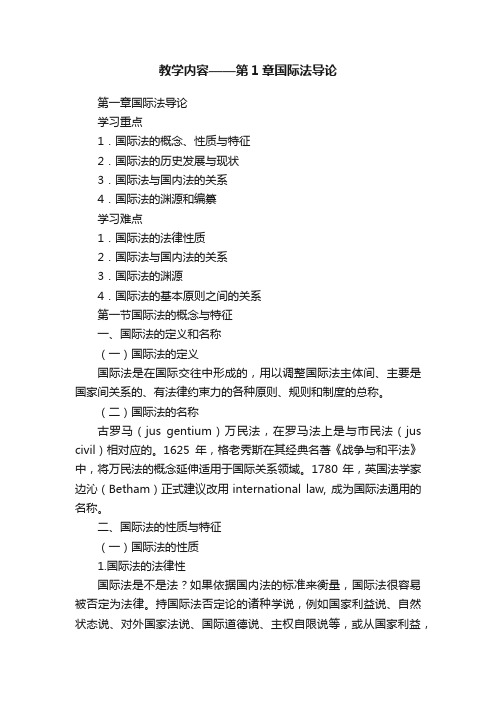
教学内容——第1章国际法导论第一章国际法导论学习重点1.国际法的概念、性质与特征2.国际法的历史发展与现状3.国际法与国内法的关系4.国际法的渊源和编纂学习难点1.国际法的法律性质2.国际法与国内法的关系3.国际法的渊源4.国际法的基本原则之间的关系第一节国际法的概念与特征一、国际法的定义和名称(一)国际法的定义国际法是在国际交往中形成的,用以调整国际法主体间、主要是国家间关系的、有法律约束力的各种原则、规则和制度的总称。
(二)国际法的名称古罗马(jus gentium)万民法,在罗马法上是与市民法(jus civil)相对应的。
1625年,格老秀斯在其经典名著《战争与和平法》中,将万民法的概念延伸适用于国际关系领域。
1780年,英国法学家边沁(Betham)正式建议改用international law, 成为国际法通用的名称。
二、国际法的性质与特征(一)国际法的性质1.国际法的法律性国际法是不是法?如果依据国内法的标准来衡量,国际法很容易被否定为法律。
持国际法否定论的诸种学说,例如国家利益说、自然状态说、对外国家法说、国际道德说、主权自限说等,或从国家利益,或从国际社会的现实状态,或从国家的意志,或以国内法为考量标准出发,都否认国际法的法律性。
此外,在实践中国际法不时遭到践踏和违反。
这些都不断引起人们对国际法法律性质的质疑。
(1)从理论上分析,关于国际法的法律性质可归结为两个问题:(a)国家具有主权是否使国际法成为不可能?(b)法是否必须是从属法,而不可能是同位法?《奥本海国际法》认为,一个法律的存在有三个主要条件:第一,必须有一个社会;第二,在这个社会必须有一套人类行为的规则;第三,必须有这个社会的共同同意,认为这些规则应由外力来强制执行。
根据上述条件来检验,在国际上存在一个由各个国家组成的国际社会是不容置疑的事实,在这个社会里存在着越来越多的调整各国之间关系的行为规则,而且这些规则在必要时是由外力强制执行的。
第一章国际法导论
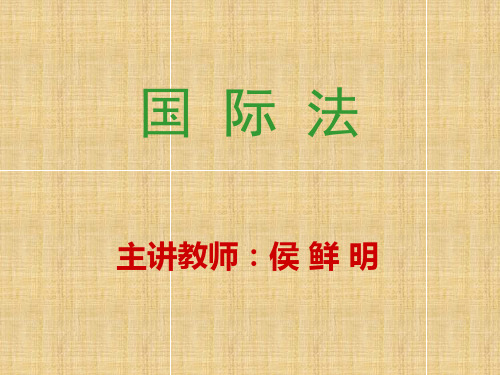
(二)二元论
这种学说的代表人物是德国的特 里佩尔、齐洛第和奥本海。
二元论的学者认为,国际法和国 内法是两个互不相同、各自独立、 平行运作的法律体系。因为它们各 有不同的主体、不同的渊源和不同 的调整对象。
处五项原则
四、基本原则的主要内容
(一)国家主权平等原则 (二)不干涉内政原则 (三)禁止非法使用威胁或武 力原则
(四)和平解决国际争端原 则
(五)民族自决原则
(六)国际合作原则
(七)善意履行国际义务原 则
三、国际法在我国国内的适用问题
(一)原则上,我国在参与制定国际 法规则时,要根据和考虑国内法的规 定和立场,而在制定国内法时,又充 分考虑和尊重所承担的国际法义务。
(二)对于条约在国内的适用和地位, 目前我国宪法没有作出统一明确的规 定。
1、条约可以直接适用。
《民事诉讼法》第237条:对享有外交特权与豁 免的外国人、外国组织或者国际组织提起的民事 诉讼,应当依照中华人民共和国有关法律和中华 人民共和国缔结或者参加的国际条约的规定办理。 第236条:中华人民共和国缔结或者参加的国际 条约同本法有不同规定的,适用该国际条约的规 定,但中华人民共和国声明保留的条款除外。
第150条:依照本章规定适用外国法律或者 国际惯例的,不得违背中华人民共和国的 社会公共利益。
(七)在国际法与国内法关系问题
上,我国的实践正在发展。
2002年8月27日最高人民法院《关于审 理国际贸易行政案件若干问题的规定》是 在这方面的最新实践。该司法解释是在我 国加入世贸组织后,针对有关WTO协议在 国内的适用所涉问题作出的。
国际法第一章国际法导论

Chapter 1 General Introduction of International Law
1. Concept of International Law 2. The Development of International Law 3. Subjects of International Law 4. Sources of International Law 5. The Codification of International Law 6. The Basis of International Law 7. The Relation between International and Domestic
第一章 国际法导论
第一节 国际法的概念 二、国际法的定义(Definition) 由此可见,国际法具有法律的共性:国际法具有标准
性,是关于国际社会成员的权利和义务关系的标准; 国际法具有强制性,是主要由国家单独或集体的强 制力量保障实施的。
Conclusion: So we should say that international law is really a law, or it is a form of law. But it is a kind of special law different from domestic law.
各国合作领域日益扩展。
第一章 国际法导论
第三节 国际法的主体 一、国际法主体的概念
国际法的主体,也被称之为法律上的“人〞,具有“人 格〞者,是指有能力享有国际法上的权利和承担国际 法上的义务,有能力进行国际关系活动的实体。 The subjects of international law may have the following three features: (1)the independent capacity to take part in the international relation independently. (2)the ability of directly undertaking the rights and duties from the international law. (3)the due competence to sue or to be sued before an international tribunal.
第一章 国际法导论
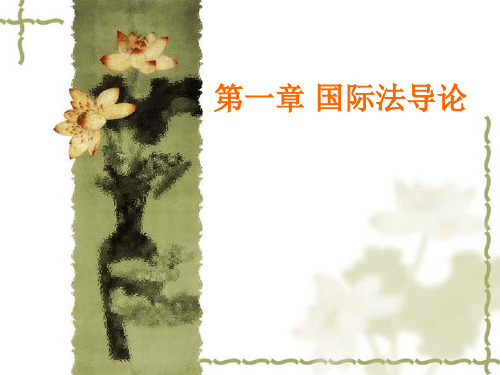
(三)中国现代国际法的定义
国际法主要是国家之间通过协议形成的 国际法主要是国家之间通过协议形成的,或者在 主要是国家之间通过协议形成的, 国际交往中各国公认的,协调各国意志的, 国际交往中各国公认的,协调各国意志的,由国家单 独或集体的强制力保证实施的原则、 独或集体的强制力保证实施的原则、规则和制度的整 体。
(二)国际法是由国家之间的协议和国际习惯形 成的
国际法是国家之间的法律,而国家与国家之间是平等的, 国际法是国家之间的法律,而国家与国家之间是平等的, 平等者之间无管辖权与被管辖权, 平等者之间无管辖权与被管辖权,国家在国际关系上是最高权 在国家之上,再没有超国家的权威。据此, 威,在国家之上,再没有超国家的权威。据此,在国际社会没 有一个超国家的立法机构, 有一个超国家的立法机构,国际法是通过国家之间签订国际协 或者由各国公认的国际习惯而形成的。 议,或者由各国公认的国际习惯而形成的。
五、国际法效力的根据
(一)国际法学派的理论学说
国际法效力的根据是国际法的一个基本理论问题。 国际法效力的根据是国际法的一个基本理论问题。研 究国际法效力的根据,就是要说明, 究国际法效力的根据,就是要说明,为什么国际法对国家 和其它国际法主体具有法律拘束力?或者说, 和其它国际法主体具有法律拘束力?或者说,为什么国家 和其它国际法主体必须遵守国际法? 和其它国际法主体必须遵守国际法?
三、国际法的特征
(一)国际法的主体主要是国家
国际社会主要是由国家组成的, 国际社会主要是由国家组成的,国际关系说到底是国家 之间的关系。国际法是国家与国家之间的法律, 之间的关系。国际法是国家与国家之间的法律,而国家具有 主权,这就决定了国际法是平等者之间的法。 主权,这就决定了国际法是平等者之间的法。在这个法律体 系中,国际法的主体主要是国家。因此, 系中,国际法的主体主要是国家。因此,国际法调整的对象 主要是国家之间的关系。 主要是国家之间的关系。
1-国际法导论

主讲人:孟喆
第一编 基本理论
[基本要求] 了解:国际法的特点及其各项基本原则。 理解:国际法与国内法的关系。 熟悉:国际法的渊源。国际法在目前我国 法律制度中的地位。
第一章 导论
第一节 国际法的性质 第二节 国际法的渊源 第三节 国际法与国内法的关系 第四节 国际法的基本原则 相关司法考试试题
2.依照国际条约规定由立法机关采取必要措施 (1)确立管辖权 [例]全国人大常委会1987.6.23《关于对中华人民 共和国缔结或者参加的国际条约所规定的罪行行 使管辖权的决定》 (2)修改法律,补充相应条文 [例]依据1970年《关于制止非法劫持航空器的公 约》增设“劫持航空器罪”。 (3)制定专门的法律法规 [例]依据《维也纳外交关系公约》,制定1986 《外交特权与豁免条例》、1990《领事特权与豁 免条例》;依据《联合国海洋法公约》,制定 《领海与毗连区法》、《专属经济区和大陆架 法》;依据《伯尔尼保护文学艺术作品公约》、 《世界版权公约》,制定《著作权法》
三、中国关于国际法与国内法关系的实践 我国宪法未作明确规定。 (一)国际条约 1.直接适用国际条约 主要是在民商范围内。从实践上看,凡是中国缔 结或加入的国际条约,经全国人大常委会批准或 经国务院核准的,一般即在中国发生效力,可以 直接适用,而无需经过特别程序。 [例]《禁止酷刑公约》 [例]《民事诉讼法》第238条 [例]《民法通则》第142条第2款:“中华人民共 和国缔结或者参加的国际条约同中华人民共和国 的民事法律有不同规定的,适用国际条约的规定, 但中华人民共和国声明保留的条款除外。”
第二节 国际法的渊源
一、国际法渊源 《国际法院规约》第38条之规定: (一)国际条约 (二)国际习惯 (三)一般法律原则 (四)确定法律原则的辅助方法 1.司法判例 2.各国权威最高之公法家学说 此外, (五)国际组织的决议
第一章国际法导论教学课件
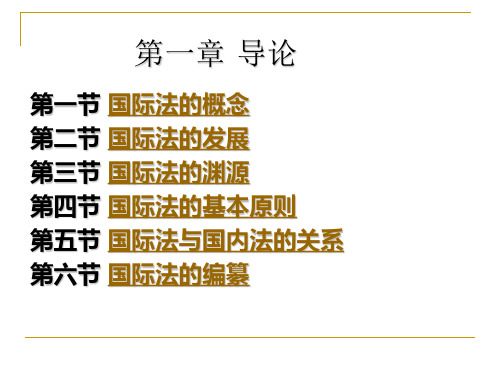
第四节 国际法基本原则
一、国际法基本原则的概念、特征 二、国际法基本原则的形成和发展 三、国际法基本原则的内容
一、国际法基本原则的概念、特征
1、定义:各国公认的、适用于国际法一切 领域的、构成现代国际法基础而具有强行 法性质的原则。
一、国际法基本原则的概念、特征
2、特征: (1)得到国际社会公认; (2)适用于国际法一切领域; (3)构成国际法基础; (4)具有强行法的性质。
二、国际法的定义
几种代表性的定义
代表性定义
(1)《奥本海国际法》作者奥本海(1858--1917)为国际法下的定义:“万国法和国际法 是一个名称,用以指文明国家认为在它们彼此 交往上有法律拘束力的习惯和条约规则的总 体。” 第八版(劳特派特):“各国认为在 他们彼此交往中有法律拘束力的习惯和条约规 则的总体”。
代表性定义
C、目前通说认为: 国际法主要是国家之间的法律,是在国际 交往中形成的,为各国所公认的,主要调 整国家之间关系的具有拘束力的原则、规 则和制度的总称。
三、国际法的特征
1、从法律关系的主体看: 国际法的主体主要是国家。 民族解放组织和国际组织在特定条件下和一 定范围内也可以成为国际法的主体;至于自 然人和法人的国际法主体问题,有争议。
《国际法院规约》第38条
第三节 国际法的渊源
国际法的辅助资料
4、国际司法判例 5、权威公法家学说 6、国际组织的决议
1、国际条约
国际条约作为国际法渊源应注意:
(1)所谓国际条约,是指两个或两个以上 国际法主体依据国际法而缔结的规定其相互 之间权利和义务的主要是书面形式的协议。
1、国际条约
(2)“凡具有掠夺性、侵略性的不平等条 约,自始至终都是非法的、无效的,与 国际法的渊源毫无共同之处”。
司考国际法考点导学

司考国际法考点导学
1.司考国际法导论(国际法的演变,国际法渊源与编纂,国际法与国内法的关系,国际法的基本原则如主权平等、不干涉内政、不使用威胁或武力和民族平等自决)。
2.国际法的主体(个人是否是国际法的主体,国家要素和基本权利,国家的管辖权和豁免,国家的承认与继承,联合国的体系,国际责任)。
3.国际法上的空间划分:
(1)领土:领土主权和限制(一般和特殊),领土取得的方式(包括传统与现代),南极;
(2)海洋法:领海、专属经济区、大陆架、群岛水域,公海和海底区域;
(3)航空法:基本制度(芝加哥公约),国际民航的损害赔偿责任(华沙公约),民航安全制度,外层空间制度(营救制度、登记制度和责任制度);
(4)环境保护制度(大气、海洋、危险废物、自然生态和资源保护);
(5)居民制度(国籍、外交保护、引渡和庇护、国际人权法)。
4.对外关系:
(1)外交和领事关系:外交机关以及外交和领事的特权与豁免;
(2)条约法:条约成立的实质要件、条约的保留、条约的效力(冲突和第三国的问题)、条约的解释和条约的终止;
(3)国际争端和平解决:传统和现代的方法、国际法院的职权;
(4)战争法:第一部分战争的开始和结束、中立国。
第二部分作战中的规则、作战手段和方法、保护平民、交战人员和战争受难者(作战手段与方法是海牙体系,保护平民和战争受难者是日内瓦体系)。
[VIP专享]国际法导论
![[VIP专享]国际法导论](https://img.taocdn.com/s3/m/0a75a6f31ed9ad51f01df2dc.png)
第一章导论名词解释国际法(international law):是指调整国际法主体之间、主要是国家之间关系的,有法律拘束力的原则、规则和制度的总体。
国际法主体:是指有能力享有国际法上权利和承担国际法上义务,有能力进行国际关系活动的实体。
国际法的渊源:是指国际法规范表现的形式或形成的过程、程序。
主要是国际条约和国际习惯。
国籍法的编纂(codification):狭义一般是指把现有的国际法规则,特别是习惯法规则,加以准确的表述和条文化、系统化;广义则一般还包括修订、补充原有规则或提出新的规则,将它们编成条款草案,由一个有权确定的机构,通常是外交会议,予以认可,并通过一定程序,形成为国际公约。
问答题1、试述国际法的法律性质。
(国际法是不是法律)答:(一)世界各国公认国际法的存在及其约束力;(二)任何单位(单个)的国家不能改变国际法的规范;(三)遵守国际法是通常状况,违法国际法是例外;(四)违反国际法是要承担国际法律责任的:1.建立国际性司法机构(前南法庭,国际法院,国际刑事法庭);2.限制并禁止条约的保留(《国际海洋法公约》)追求公平公正。
3、国际法的渊源有哪些?答:联合国《国际法院规约》第38条被认为是对国际法渊源的权威说明。
当前,普遍认为国际法的渊源包括:一、国际条约。
条约是指国家间、国家与国际组织间或国际组织相互间所缔结的书面协定,它是现代国际法最重要的渊源。
一般包括造法性条约和契约性条约。
二、国际习惯。
国际习惯是经接受为法律的一般实践、惯例或做法,它是国际法最古老的渊源。
国际习惯包括其主观要件,即国际法主体不断实践后确定法律概念、法律规范等,及客观要件,即国际法主体在国际实践中不断重复某种行为。
三、一般法律原则。
是“为文明各国国内法共同认可的一般法律原则”,是国际法渊源。
周鯁生认为,《国际法院规约》第38条列入这样一项规定,只能认为是准许法院在审判某种案件时,在从习惯或条约中都找不出适用的规范的场合,比照适用一般法律原则,作为变通解决办法;而那并不具有新创一种国际法渊源的作用。
国际法

中国宪法未对国际法在国内的地位及如何适用作成一般性规定,只是在若干部门法中对这一问题有所规定。
中国对其缔约的国际条约的适用,“采纳”和“转化”两种方式都兼而采之,但从实践来看,中国对条约多采用直接适用的方式。对国际习惯争议较多。
七、国际法基本原则
国际法原则是指被各国公认、具有普遍意义、适用于国际法各个领域、构成国际法的基础、并具有强行法性质的原则。
或承认新政府为国家的正式代表,并表明愿意同它发生或继续保持正常关系。
引起政府承认的原因:
政府更迭:(1)社会革命(2)政变
承认的依据:
“有效统治”原则,即新政府必须能在其控制下的领土有效地行使权力,并且得到了人民的支持和服从
三、国际法上的继承
(一)国家继承
国家继承是指由于领土变更的事实而引起一国的权利和义务转移给另一国所产生的法律关系。
6.私人行为:(1)私人如果经国家授权行使政府权力要素,并在特定情况下以此种资格行事;(2)私人行为如果实际上按照国家指示或在其指挥或控制下行事;(3)私人在官方当局不在时或缺席和需要行使政府权力要素时(4)政府对私人的行为予以确认并当做国家的行为;(5)如果国家纵容或唆使私人对他国做侵害行为,或未“适当注意”防止私人对他国做出侵害行为。
2、国家承认的条件:
(1)新产生的实体具备了国际法意义上的国家要素。(2)新国家必须是符合国际法原则而产生。
3、国家承认的方式:
明示和默示。
法律上的承认与事实上的承认。
4、国家承认的法律效果:
①两国关系正常化,可以建立正式外交关系和领事关系;
②双方可以缔结政治、经济、文化等各方面的条约或协定;
4、管辖权:
国际法课件_国际法导论
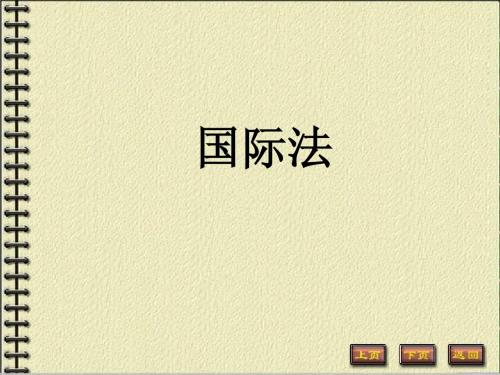
国际法专指的是国际公法,而国际私法 主要调整的是具有涉外关系的民事法 律关系发生法律抵触时的法律适用问 题。 国际法与部门法 普遍国际法与特殊国际法/区域国际法
• 二、国际法的作用
国际法功能体现在社会作用和规范作用: 1、社会作用在于通过体现各国的协调意 志来为各国在国际关系交往中的需要服 务。 2、规范作用表现在指引、评价、教育、 预测和强制伍方面。
违反国际法行为的救济措施: 对于那些违反国际法行为的国家,可以 通过受害国单独地或与其它国家集体采 取相应的强制措施,以保护受害国的权 利,并保证国际法能够得到较有效的实 施。如:警告,要求终止不法行为、保 证不再重犯、恢复原状、赔偿,采取报 复措施,实行经济制裁等。
(二)、国际法的概念 教材上的定义:是国家之间在交往过程中形成 并经各国协议确认的,主要用以调整国家之 间关系的具有法律拘束力的原则、规则、规 章和制度的总称。 赵建文先生的定义:“国际法是对国际社会成 员具有法律拘束力的行为规范.” 端木正先生的定义:“国际法主要是国家在其 相互交往中形成的,主要调整国家间关系的 有拘束力的原则、规则和规章制度的总和。
国家的行为在传统国际法上几乎未受到 什么约束。 (1) 、在传统国际法中国家能在最大程度 地自由决定自己的体制,政治体制、经 济制度法律体系等。 (2) 、国家完全自主决定对外政策。在传 统国际法上,国家有权参加任何条约:
但是在一战后,特别是在二战之后,国 际法在国家行为的自由上增加了一些限 制,主要表现在三方面: (1) 、大量国际条约的建立了范围广泛的 网络,绝大多数的国家都是国际条约的 签约国,大量的条约也因此影响着各个 签约国的国内法律体系。 (2)、禁止使用武力的各种法律约束 (3) 、强行法 (jus cogens) 限制了各国的 行为。
国际公法 第一章 导论

国际法与国内法的关系
二、国际法在国内的效力 1、 国际法在一国之内并不当然有效力,其效 力原则上由国家自行决定。国家可以规定,当 国际法与国内法抵触时国内法为优先,也可以 规定国际法为优先。规定国内法优先并不必然 意味着该国不履行国际义务。 2、习惯在国内法上的效力 3、条约在国内法上的效力
国际法与国内法的关系
三、国际法的类别
协定国际法与习惯国际法 传统国际法与现代国际法 普遍国际法、一般国际法与特殊国际法
四、国际法的性质和特点
国际法的法律性质
1、国际法具有一切法律所共有的规范性和强 制性 (强制性不等于强制执行) 2、国际法被作为法律规范遵守和实施
(1)各国政府承认国际法的约束力 (2)实践中为各国所遵守 (3)不能因违法行为的存在及违法行为没有 得到有效制裁就否认国际法的法律性质
并入方式会对国家形成更多限制,因为这将使 政府更多地受制于本国法院。 转化方式则使国家(政府)更便于采取违法措 施,能够增强国家对外政策的灵活性。
4、国际法可以被引入国内法 *哪些条约需要引入国内法? 调整国家间权利义务关系的条约不需要引 入;“最终”调整国家与私人之间权利 义务关系的条约和“最终”调整私人间 权利义务关系的条约需要引入国内法。
国际法与国内法的关系
* 将国际法引入国内法的两种方式: 转化; 并入(直接适用)
*不同引入方式对国家行为能力的影响
第三节 国际法与国内法的关系
一、国际法与国内法关系的理论 1、一元论 (1)国内法优先说:国家的所有对外活 动都必须以国内法为依据。 (2)国际法优先说:每种法律规范的效 力都取决于更高一个层次的规范;国际 法在国内法之上;国际法之上是“约定 必须遵守”或者“法律良知”。
国际法与国内法的关系
斯塔克国际法导论
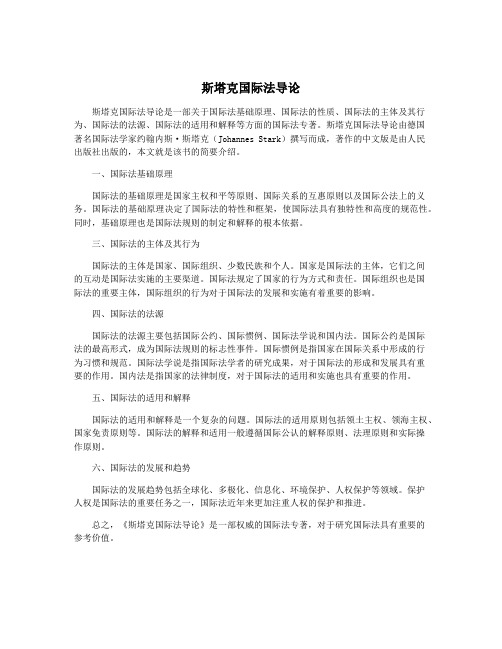
斯塔克国际法导论斯塔克国际法导论是一部关于国际法基础原理、国际法的性质、国际法的主体及其行为、国际法的法源、国际法的适用和解释等方面的国际法专著。
斯塔克国际法导论由德国著名国际法学家约翰内斯·斯塔克(Johannes Stark)撰写而成,著作的中文版是由人民出版社出版的,本文就是该书的简要介绍。
一、国际法基础原理国际法的基础原理是国家主权和平等原则、国际关系的互惠原则以及国际公法上的义务。
国际法的基础原理决定了国际法的特性和框架,使国际法具有独特性和高度的规范性。
同时,基础原理也是国际法规则的制定和解释的根本依据。
三、国际法的主体及其行为国际法的主体是国家、国际组织、少数民族和个人。
国家是国际法的主体,它们之间的互动是国际法实施的主要渠道。
国际法规定了国家的行为方式和责任。
国际组织也是国际法的重要主体,国际组织的行为对于国际法的发展和实施有着重要的影响。
四、国际法的法源国际法的法源主要包括国际公约、国际惯例、国际法学说和国内法。
国际公约是国际法的最高形式,成为国际法规则的标志性事件。
国际惯例是指国家在国际关系中形成的行为习惯和规范。
国际法学说是指国际法学者的研究成果,对于国际法的形成和发展具有重要的作用。
国内法是指国家的法律制度,对于国际法的适用和实施也具有重要的作用。
五、国际法的适用和解释国际法的适用和解释是一个复杂的问题。
国际法的适用原则包括领土主权、领海主权、国家免责原则等。
国际法的解释和适用一般遵循国际公认的解释原则、法理原则和实际操作原则。
六、国际法的发展和趋势国际法的发展趋势包括全球化、多极化、信息化、环境保护、人权保护等领域。
保护人权是国际法的重要任务之一,国际法近年来更加注重人权的保护和推进。
总之,《斯塔克国际法导论》是一部权威的国际法专著,对于研究国际法具有重要的参考价值。
- 1、下载文档前请自行甄别文档内容的完整性,平台不提供额外的编辑、内容补充、找答案等附加服务。
- 2、"仅部分预览"的文档,不可在线预览部分如存在完整性等问题,可反馈申请退款(可完整预览的文档不适用该条件!)。
- 3、如文档侵犯您的权益,请联系客服反馈,我们会尽快为您处理(人工客服工作时间:9:00-18:30)。
❖ 2、19-20世纪初,发展时期
❖ 1899和1907年两次海牙会议、十月革命胜利以及1928年《白里安—凯 洛哥公约》的签定—— 互不侵犯、和平解决国际争端原则
❖ 3、20世纪中至今,深入发展时期
❖ Subjects (actors) of International Law
(1)possess international rights and duties (2)can enter into international legal relations (3) can make international claims
the purposes of the United Nations
❖ 互不干涉内政原则
❖ 任何国家或国家集团都无权以任何理由直接或间接地对 别国进行干涉,不得以任何借口干涉他国的内政与外交 事务,不得以任何手段强迫他国接受别国的意志、社会 政治制度和意识形态。
❖ The principle concerning the duty not to intervene in matters within the domestic jurisdiction of any State, in accordance with the Charter
❖ In addition to the rights granted to individuals, international law also has endowed them with responsibilities. In particular, following the Nürnberg Charter (1945) and the subsequent establishment of a tribunal to prosecute Nazi war criminals, individuals have been subject to international criminal responsibility and have been directly liable for breaches of international law, irrespective of domestic legal considerations.
❖ 领土完整是国家领土主权的表现,国家之间相互尊 重领土完整是尊重国家主权的最主要内容。
❖ Territorial integrity is the principle under international law that nation-states should not attempt to promote secessionist movements or to promote border changes in other nation-states. Conversely it states that border changes imposed by force are acts of aggression.
the international community are developed.
❖
返回
❖ Sources of international law art. 38 (1) Statute ICJ
❖ international conventions ❖ International Custom ❖ General Principles of law ❖ Judicial decisions, (binding) decisions of Int’l Organizations
❖
back
❖ 1 States : full, unlimited, original ❖ 2 International organizations: functional, limited, derived ❖ 3 Liberation Movements
❖
back
❖ 国际法主体,是指具有独立参与国际关系的能力并在国际法 上直接享受权利和承担义务的当事者或人格者。
not endangered
❖ 善意履行国际义务原则 ❖ The principle that States shall fulfil in good faith
the obligations assumed by them in accordance with the Charter, other international treaties as well as international custom
保护的责任之提出
❖ 2004年12月,威胁、挑战和改革问题高级别小组的 报告(The High-level Panel on Threats, Challenges and Change)在其《一个更安全的世界:我们的共 同责任》(A More Secure World: Our Shared Responsibility)中明确表示:“我们赞同新的规范, 即如果发生灭绝种族和其他大规模杀戮,国际社会 集体负有提供保护的责任,由安全理事会在万不得 已情况下批准进行军事干预,以防止主权国家政府 没有力量或不愿意防止的族裔清洗或严重违反国际 人道主义法行为。”
❖
❖ 互不侵犯原则是指各国在其相互关系中不得以任何借口 进行侵略,不得以违反国际法的任何其他方法使用武力 或以武力威胁侵犯另一国的主权、独立或领土完整,不 得以战争作为解决国际争端的手段。
❖ The principle that States shall refrain in their international relations from the threat or use of force against the territorial integrity or political independence of any State, or in any other manner inconsistent with
❖
保护的责任之提出
❖ 2001年9月11日劫机袭击事件震惊全球,随 着国际关系的演变,国际法的一些基本原则 和制度受到了严重的挑战。
❖ 2001年12月,加拿大干预和国家主权委员会 (International Commission on Intervention and State Sovereignty)正式提交了《保护 的责任》(The Responsibility to Protect)报告
❖ 平等互利原则、和平共处原则、民族自决原则
❖ 和平解决国际争端原则:The principle that
States shall settle their international disputes by peaceful means in such a manner that international peace and security and justice are
❖ 联合国的成立以及一系列国际条约文件的签署使国际法基本原则继续深 入发展
❖ 国际法各项基本原则:
❖ 互相尊重主权和领土完整原则
❖ 主权,即国家主权,是国家的最重要属性,是国家 在国际法上所固有的独立处理对内对外事务的权力。 主权不可分割,不可让予。
❖ 主权作为国家的固有权利,表现为三个方面:对内 的最高权、对外的独立权和防止侵略的自卫权。
❖ 国际法主体的类型及各自的地位
❖ 个人在国际法上的地位:我国国际法学界一般倾向认 为个人不具有国际法主体资格 ;从目前的国际现实 看,即使承认个人在国际法的某些领域具有国际法 主体资格,其范围也是很有限的。
❖
返回
Non-state actors in international
law —— Individuals
❖ 在实践中,要使国际法在国内得以实施,着重要解 决好两个方面的问题:一是摆正位置;二是解决冲
突.
❖
返回
❖ 国际法基本原则的概念和特征:
❖ 概念略 ❖ 特征: ❖ 各国公认,具有普遍意义,构成国际法的基础,具
有强行法的性质
❖ 国际法基本原则的发展历程:
❖ 1、 17—19世纪,萌芽和初步形成时期
❖ 2005年《世界首脑会议成果文件》对 “保护的责任”作了非常谨慎的描述。这一 文件将“保护的责任”的适用范围严格限于 “种族灭绝、战争罪、种族清洗和反人类罪” 等4种严重的国际罪行。
保护的责任对主权内涵和国际法原则的影响
❖ 国家主权不仅是一种权利,而且是一种义务 或责任。在这些责任中,最重要的就是保护 本国公民免遭暴力和战争的责任。
❖ Historically, states were the only subjects of international law. During the 20th century, however, a growing body of international law was devoted to defining the rights and responsibilities of individuals. The rights of individuals under international law are detailed in various human rights instruments and agreements.
国际法导论
❖ 国际法的概念 ❖ 国际法的历史发展 ❖ 国际法的渊源 ❖ 国际法的主体 ❖ 国际法的基本原则 ❖ 国际法与国内法的关系sm):
❖ 国际法优先说、国内法优先说
❖ 二元论(dualism):
❖ 采纳(adoption)、转化(transformation)
保护的责任之提出
❖ 2005年3月,联合国秘书长安南在其《大自 由:实现人人共享的发展、安全和人权》(In Larger Freedom, Towards Security, Development and Human rights for All)报告 中 再次提到保护的责任。
